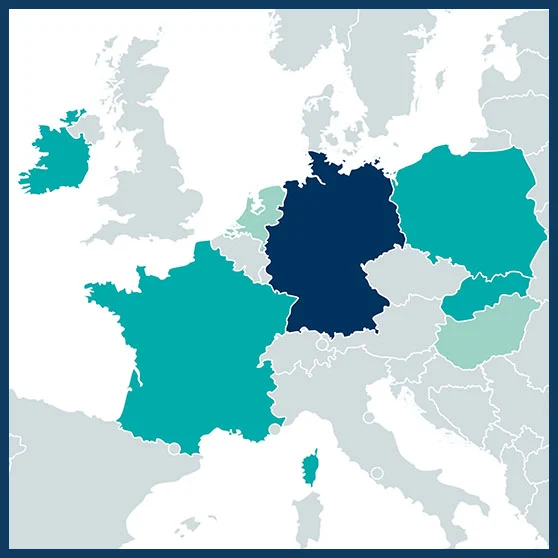01/04/2020 – 31/04/2022
€ 242,936
Klaus Birkhofer
Klaus.Birkhofer@b-tu.de
Coordinator: Ecology – Brandenburg University of Technology – Cottbus – Germany
Nutritional Epidemiology (EREN) – INRAE/ INSERM/CNAM/Paris 13 University – Bobigny – France
Grassland Ecosystem (UREP) – INRAE/ Vetagro Sup – Clermont–Ferrand – France
Vineyard Health and Agroecology (SAVE) – INRAE/Bordeaux Sciences Agro – Villenave d’Ornon– France
Ecology and Botany – Hungarian Academy of Sciences – Vácrátót – Hungary
School of Agriculture and Food Science – University College Dublin – Dublin – Ireland
Ecology and Biogeography – Nicolaus Copernicus University Toruń – Torún – Poland
Functional and Organic Food and Commodity – Warsaw University of Life Sciences – Warszawa – Poland
Environmental and Plant Parasitology – Institute of Parasitology – Košice – Slovakia
Environmental Studies – Vrije Universiteit Amsterdam – Amsterdam – The Netherlands

Agricultural intensification contributes to global food security and health by supplying the food demand of a growing human population, but also causes environmental problems. Ecological intensification has been proposed as viable alternative to achieve a balance between negative environmental issues, such as the ongoing loss of biodiversity, and sufficiently high and qualitative food production. The functional diversity of biotic communities is an understudied dimension of biodiversity which may be particularly relevant for the links between ecological intensification, biodiversity, pollination, pest control and human food and livestock fodder production.
Previous studies addressed the effects of ecological intensification on the functional diversity of single taxonomic groups in individual countries without considering links between functional diversity and plant, animal or human health across different landscapes and climatic regions. FunProd will undertake the joint synthesis of existing databases on these aspects in organic agriculture and permanent grasslands in Europe to provide a significant contribution to the evidence base for such links across different climatic regions and a range of landscapes. Closing this knowledge gap will contribute to the development of nature-based agricultural systems that provide simultaneously high levels of plant protection and health, together with sufficient productivity and quality to support the global human population, all while reducing environmental impact of agriculture. To this end, FunProd will address the following specific questions:
• Does ecological intensification enhance the functional diversity of biotic communities across taxonomic groups compared to conventional intensification and does the effect depend on climatic conditions, landscape structure and/or agri- cultural system?
• Does the effect of ecological intensification on the functional diversity of local communities explain the observed effect of ecological intensification on crop protection, pollination and health?
Can a high functional diversity reduce the yield gap between agricultural production systems that focus on ecological and conventional intensification in Europe, and thereby contribute to future food security and quality?
Four workshops are planned and will allow:
• to link existing databases on species composition of animal communities with databases on functional traits (meeting 1);
• to analyse the effect of ecological intensification practices on functional diversity metrics (meeting 2 & synthesis paper 1);
• to develop models that link functional diversity to pollination and pest control services and crop plant health (meeting 3 & synthesis paper 2).
At the final meeting (meeting 4) these results will be linked to information on human health effects of organic agricultural products and yields (synthesis paper 3). These results will be used to develop a final set of dissemination products (e.g. policy brief and farmer magazine article) for the project’s target audiences (e.g. regional policy-makers and farmer associations).